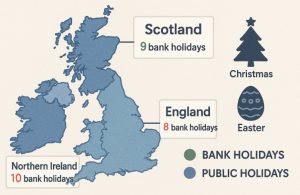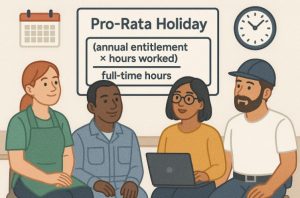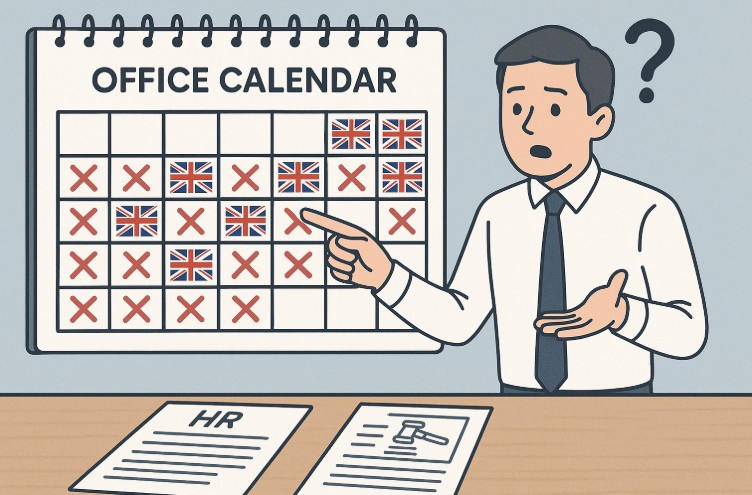Annual leave allowance is a crucial component of an employee’s overall compensation package in the UK.
It not only helps maintain a healthy work-life balance but also ensures compliance with the country’s employment laws.
A common point of confusion for both employers and employees alike is the inclusion of bank holidays within the 28-day statutory holiday entitlement.
This blog explores whether 28 days of holiday includes bank holidays, how to correctly communicate leave policies, and the best practices to implement for your business.
What Is The Statutory Annual Leave Entitlement In The UK?

In the United Kingdom, the minimum annual leave entitlement is established by the Working Time Regulations 1998.
The regulations provide that workers are entitled to 5.6 weeks of paid annual leave each year. For a full-time employee who works five days a week, this equates to 28 days.
The 28-day entitlement is a statutory minimum, which can be more generous depending on the employer’s policy.
However, it is important to understand that these 28 days may include bank holidays, depending on how the employment contract is written.
Statutory leave entitlement includes:
- Full-time workers: 28 days (5.6 weeks)
- Part-time workers: A pro-rata equivalent of 5.6 weeks
- Zero-hour or irregular workers: Accrued leave based on hours worked
The employer has the discretion to include or exclude bank holidays from the total allowance. This flexibility often leads to confusion if contract terms are not clearly defined.
Do The 28 Days Of Holiday Automatically Include Bank Holidays?
The statutory 28 days of annual leave do not automatically include bank holidays. It is the employer’s decision whether or not to include them as part of the total entitlement.
Employers may offer annual leave in the following formats:
- 20 days of leave plus 8 bank holidays
- 28 days of leave that includes bank holidays
When employers state “28 days of holiday” without clarification, employees might assume they are entitled to 28 flexible days in addition to the 8 bank holidays. In reality, the 28 days often represent the total, inclusive amount.
It is important for employers to specify their leave structure to prevent misinterpretation. A clear clause in the contract can help avoid future disputes and confusion.
How Do Bank Holidays Differ From Public Holidays In The UK?

In the UK, the terms bank holidays and public holidays are often used interchangeably, but they are not always the same. Understanding the distinction is important when reviewing or creating an annual leave policy.
Definition Of Bank Holidays
Bank holidays are official holidays designated by the UK government. They were originally days when banks closed for trading, but they have since evolved to become widely recognised national holidays.
There are eight standard bank holidays in England and Wales:
- New Year’s Day
- Good Friday
- Easter Monday
- Early May Bank Holiday
- Spring Bank Holiday
- Summer Bank Holiday
- Christmas Day
- Boxing Day
In Scotland and Northern Ireland, the list varies slightly and may include additional holidays, such as St Andrew’s Day or St Patrick’s Day.
What Are Public Holidays?
The term public holiday is more general and can refer to any day recognised by the government or tradition where most businesses may close and employees typically have the day off. In practice, all bank holidays are public holidays, but not all public holidays are statutory.
For example, in some regions of the UK, additional public holidays may be granted by local authorities for significant events, but these may not be officially designated as bank holidays.
Legal Obligation To Observe Bank Holidays
There is no legal obligation for employers in the UK to give employees time off on bank holidays. Whether or not employees receive paid leave on these days is determined by the terms set out in their employment contract.
Employers can choose to:
- Count bank holidays as part of the 28-day statutory leave
- Offer bank holidays in addition to statutory leave
- Require employees to work bank holidays and offer an alternative day off or compensation
This flexibility means that two employees working for different companies could have very different experiences regarding public holidays.
Bank Holidays In Different Parts Of The UK
| Region | Typical Bank Holidays | Notes |
| England & Wales | 8 | Follows standard national list |
| Scotland | 9 | Includes St Andrew’s Day, different dates |
| Northern Ireland | 10 | Includes St Patrick’s Day and Battle of the Boyne |
It is essential that employers understand these regional differences, particularly if their workforce is spread across different nations within the UK.
What Does Your Employment Contract Say About Holiday Entitlement?

An employee’s holiday entitlement, including the treatment of bank holidays, should be clearly specified in their employment contract. This is a key legal document that outlines the terms and conditions of employment and helps avoid misunderstandings about leave entitlements.
Importance Of Clear Contract Wording
The way holiday entitlement is worded in a contract can significantly affect how leave is administered. For example:
- If the contract says “28 days inclusive of bank holidays”, it means that the 8 standard bank holidays are part of the total 28 days
- If it says “20 days plus bank holidays”, the employee gets 20 flexible days to book off, plus 8 bank holidays granted separately
Lack of clarity in the wording can lead to confusion. Employees may mistakenly believe they are entitled to 28 days plus 8 bank holidays, resulting in disputes that could have been avoided with precise language.
Examples Of Holiday Clause Wording
Employers should consider using transparent wording in contracts. Here are some examples:
| Contract Clause | Interpretation |
| “28 days of holiday per year” | May be interpreted as inclusive unless stated |
| “28 days, inclusive of bank holidays” | 20 flexible days + 8 fixed bank holidays |
| “20 days plus bank holidays” | 28 days total – 20 chosen by employee |
| “25 days plus bank holidays” | More generous – 33 total days off |
Providing examples or explanations in an employee handbook can further assist employees in understanding their entitlements.
Specific Considerations For Part-Time Employees
Part-time employees must also have their contracts carefully worded to reflect their working pattern and how it affects their leave. Employers must ensure that:
- Part-time staff receive a pro-rata holiday entitlement
- Bank holidays that fall on days the employee does not normally work are handled fairly
- Any confusion around whether a bank holiday counts as leave is addressed in the contract
For example, if a part-time employee works Tuesdays to Thursdays, and most bank holidays fall on Mondays, they may not automatically benefit unless the contract provides equivalent time off.
Avoiding Disputes Through Transparency
Poorly worded or ambiguous contracts can lead to disputes about leave entitlement. These can affect team morale and damage the employer-employee relationship. To avoid this, employers should:
- Include specific clauses addressing the treatment of bank holidays
- Clearly outline any variations based on work patterns or contract types
- Update contracts and handbooks in line with legal changes or company policy updates
A transparent and fair holiday policy not only supports legal compliance but also contributes to employee satisfaction and trust in the workplace.
Is Holiday Pay Affected By Bank Holiday Inclusion?
The calculation of holiday pay remains the same regardless of whether bank holidays are included in the total leave entitlement. The method used must reflect the employee’s normal remuneration.
Holiday pay must be calculated based on:
- Fixed regular hours: Basic weekly or monthly wage
- Variable hours: Average pay from the last 52 paid weeks
- Shift workers: Average shift earnings over a relevant reference period
When bank holidays are included in the 28 days, employees have fewer days to choose for personal holidays, but the rate of pay for these days must still reflect normal earnings.
The inclusion of bank holidays does not affect the rate of pay, but it can affect the timing and flexibility of when leave can be taken.
How Does Part-Time Or Irregular Work Affect Holiday Allowance?

Part-time and irregular-hour employees are legally entitled to the same 5.6 weeks of annual leave, calculated pro-rata based on the number of days or hours worked.
For example:
| Working Pattern | Calculation | Statutory Entitlement (Approx) |
| 3 days per week | 3 × 5.6 | 16.8 days |
| 2.5 days per week | 2.5 × 5.6 | 14 days |
| Zero-hour contract | Accrual method | Based on actual hours worked |
In practice, calculating holiday for part-time and irregular workers requires the use of government-provided calculators to ensure fairness and legal compliance.
Employers should define how bank holidays affect these employees clearly. For example:
- If the worker normally works Mondays and the company closes on bank holidays, that day may be automatically deducted from their allowance
- If the worker never works on a bank holiday, they may not be entitled to it off
Can Unused Bank Holidays Be Carried Over Or Paid Out?
In general, statutory annual leave must be used within the leave year. However, there are exceptions where carry-over is permitted:
- If the employee was unable to take leave due to sickness
- If maternity, adoption, or paternity leave overlapped with the holiday year
Employers can allow greater flexibility within their own internal policies. For instance, some may offer:
- Up to 5 days carry-over into the next year
- Buy and sell leave schemes for additional flexibility
At termination of employment, any unused statutory leave must be paid out at the employee’s normal rate of pay.
| Scenario | Can Leave Be Carried Over? | Notes |
| Sickness during leave year | Yes | Up to 4 weeks may be carried over |
| Maternity or shared parental leave | Yes | Full allowance can be carried over |
| No exceptional circumstances | No | Leave is usually forfeited at the year-end |
| Contract allows additional carry-over | Yes | At employer’s discretion, beyond legal requirements |
What Are The Employer’s Responsibilities Around Annual Leave?
Employers in the UK have a legal duty to:
- Provide the correct amount of statutory leave
- Inform employees of how their leave is calculated
- Maintain proper records of leave accrued and taken
- Avoid discrimination or unfair treatment regarding leave approval
Failure to meet these responsibilities can lead to employment disputes or even tribunal cases. Best practice includes:
- Using written contracts with detailed holiday clauses
- Providing employee handbooks or internal policies that explain holiday rules
- Offering a holiday tracking system to ensure transparency
Employers must also remember that part-time, temporary, and agency staff are entitled to the same statutory leave, calculated on a proportionate basis.
How Can Employees Ensure They Receive Their Full Legal Holiday Entitlement?
Employees should take a proactive role in understanding their annual leave rights. To ensure they receive their full entitlement, they should:
- Review the employment contract carefully for clarity on leave policy
- Ask HR or management for written clarification if anything is unclear
- Use the Government’s holiday entitlement calculator to confirm their allowance
- Keep records of leave requests and approvals
If an employer denies lawful entitlement or fails to pay holiday pay accurately, employees can raise the issue formally through grievance procedures or seek assistance from ACAS.
Are There Any Upcoming Changes To UK Holiday Entitlement Laws?

As of now, there have been no official changes to the Working Time Regulations governing holiday entitlement, but ongoing discussions and court cases may influence future interpretations, especially for:
- Gig economy and zero-hour workers
- Irregular-hours and part-year contracts
- Enhanced protections around rollover rights
Post-Brexit flexibility in employment laws may also lead to policy reforms. Employers should stay updated through reliable sources such as GOV.UK and ACAS, and be prepared to adjust their internal policies if changes are introduced.
Conclusion
To summarise, 28 days of holiday may or may not include bank holidays, depending on the wording in the employment contract. Employers can legally structure leave policies to either include or exclude bank holidays within the 28-day minimum entitlement.
For both clarity and compliance, it is vital that employment contracts specify how holiday is calculated and what is included. Clear communication of holiday entitlement not only ensures legal compliance but also improves employee satisfaction and trust.
Frequently Asked Questions
How many bank holidays are there in the UK each year?
There are generally eight bank holidays each year in England and Wales. Scotland and Northern Ireland may have additional or alternative dates.
Can employers refuse time off on bank holidays?
Yes, unless otherwise stated in the employment contract, employers can refuse requests for leave on bank holidays. There is no statutory right to take them off.
Is it legal to work on a bank holiday in the UK?
Yes. Unless your contract guarantees time off, an employer can require you to work on bank holidays, subject to reasonable notice.
Do part-time workers get fewer bank holidays?
They receive a pro-rata equivalent of bank holidays, which may be included in their statutory leave allowance or granted separately.
How is annual leave calculated for shift workers?
It’s based on the average hours or shifts worked over a specific reference period, using an accrual system under the Working Time Regulations.
What happens to bank holidays when you’re on sick leave?
You can still accrue holiday during sick leave. If you miss a bank holiday due to illness, you may be entitled to take it at another time, depending on your contract.
Do public sector workers get more holidays than private?
Often, yes. Many public sector employers offer more generous leave allowances, but this varies depending on the employer’s internal policy.\








